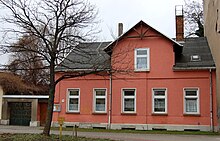Otto Siebert
Karl Otto Siebert (born July 4, 1869 in Magdeburg - Sudenburg ; † January 27, 1963 in Magdeburg- Fermersleben ) was a German Protestant theologian, philosopher and writer.
Life
Siebert was born as the son of the teacher Wilhelm Siebert . His mother was Emilie Raute . He attended the Realgymnasium Magdeburg, the pedagogy of the monastery Our Dear Women and the Wilhelm-Gymnasium Magdeburg. From 1889 to 1892 he studied at the University of Halle and received his doctorate. phil. He was ordained on March 31, 1897 and then worked from 1897 to 1903 as an assistant preacher at the church in the village of Fermersleben . In 1903 he became pastor of the parish and remained so until his retirement on September 1, 1946. During this time and later as a pensioner, he lived in the house of the Fermersleber parish Alt Fermersleben 71 .
Standing on a Christian standpoint, he turned against the teachings of Friedrich Nietzsche in particular . In 1902 he described Nietzsche's views as "the madness of an insane man" through which science had "long since become the order of the day" . Elsewhere he described Nietzsche's philosophy as "a shiny bowl, but a void content" . He was also hostile to Darwinism. In 1905 he stated that one would begin to move on to the order of the day by adhering to a teleological theory of evolution based on Darwin's principles. He was considered a supporter of Rudolf Euckens .
Works
- The metaphysics u. Ethics of Pseudodionysius Areopagita , 1894
- History of modern German philosophy since Hegel , 1898
- Anthropology and religion in their relationship to one another , 1902
- Friedrich Nietzsche's "The Will to Power, Attempt to Revaluate All Values." in Deutsch-Evangelische Blätter , year 27, Halle 1902, pages 149–170
- Something about the latest Nietzscheband in Church weekly for Protestant Christians, number 43 from October 24, 1902, columns 678–682
- Friedrich Nietzsche and his last published work in German monthly for the entire life of the present , Volume 2, Berlin 1902/1903, pages 868–874
- Evolution of the human race , 1903
- Rudolf Eucken's world and life views , 1904
- Man in his relationship to a divine principle , 1904
- Outline of the History of Philosophy , 1905
- The philosophy of religion in Germany , 1906
- Arthur Schopenhauer . His philosophical system based on the major work "The world as will and imagination" is demonstrated. , Stuttgart 1906
- The resurgence of religious life , 1906
- R. Eucken et al. the problem of culture , 1907
- Friedrich Nietzsche's worldview in pedagogical view
literature
- Kürschner's German Literature Calendar , GJ Goschen'sche Verlagshandlung Leipzig 1904, column 1262
- Pastors' book of the ecclesiastical province of Saxony , Volume 8, Biograms Schr-To, Evangelische Verlagsanstalt Leipzig, 2008, ISBN 978-3-374-02140-6 , page 242
Individual evidence
- ↑ Something about the latest Nietzscheband in Kirchliche Wochenschrift für Evangelische Christians number 43 of October 24, 1902, columns 678–682
- ↑ Friedrich Nietzsche's world view in Pedagogical Control
- ↑ Otto Siebert, A Brief Outline of the History of Philosophy , Hermann Beyer & Sons Langensalza 1905, page 205
- ^ Rudolf Eisler , Philosophen-Lexikon , Berlin 1912, page 675 f.
| personal data | |
|---|---|
| SURNAME | Siebert, Otto |
| BRIEF DESCRIPTION | German Protestant theologian and philosopher |
| DATE OF BIRTH | 4th July 1869 |
| PLACE OF BIRTH | Magdeburg - Sudenburg |
| DATE OF DEATH | January 27, 1963 |
| Place of death | Magdeburg - Fermersleben |
